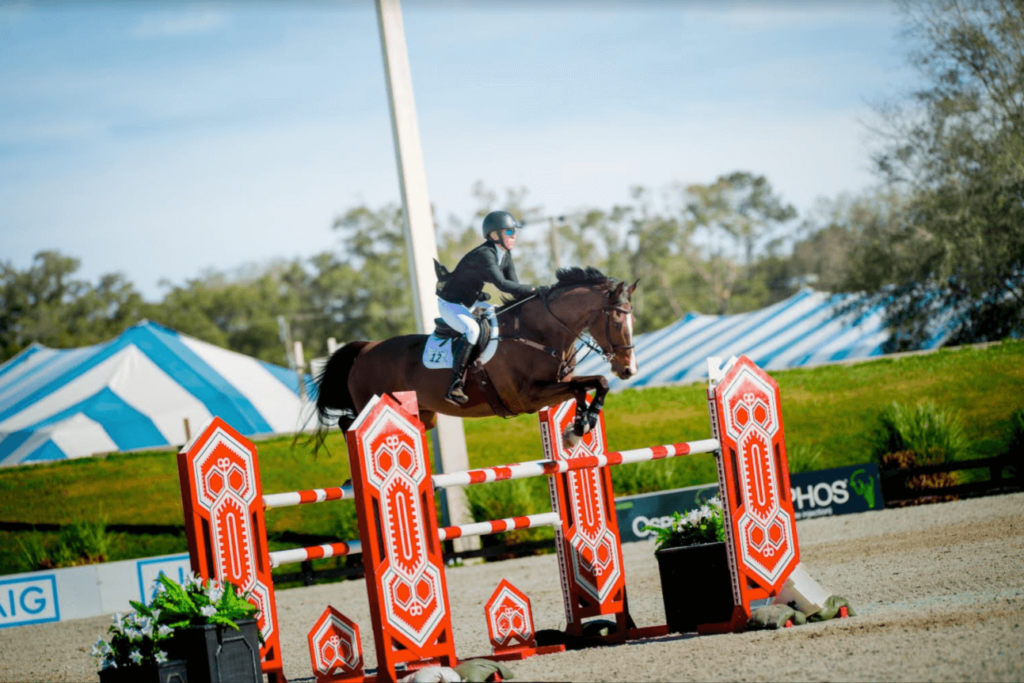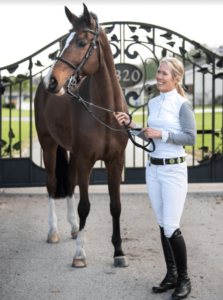An experienced agent, and grand prix jumper rider, weighs in to answer common questions. By Laura Connaway.
If you own a horse, or plan to own one, it’s a wise decision to have him insured. We all know that horses are pricey – and often, the most expensive part of owning a horse goes far beyond the initial purchase price. It’s the monthly board checks, showing and training fees, countless tack and supplies, and all the other costly pieces that go along with being an owner. And if your horse becomes injured, the medical bills can start adding up fast. Equine insurance can offer you peace of mind to give your horse the best care he might need in a medical situation – plus, you can protect your investment.
When it comes to finding an agent, it certainly helps when they understand your sport and the types of activities your horse will be doing. That way, they can give you the best advice on what products might be a good fit for you. Plus, if you do end up filing a claim for a medical issue, they’ve often encountered a similar situation with another owner and can easily walk you through the process.
I am a lifetime equestrian and have been a frequent competitor in the jumper ring with my own homebreds for decades. When I launched my own equine insurance agency, Connaway & Associates, back in 1992, I wanted to create a company that really connected with our fellow riders and horse owners. All of us at the agency are farm and horse owners, and many of us are show jumping riders, just like our clients.
 Laura Connaway competing in a grand prix class with her horse, Quite Funny.
Laura Connaway competing in a grand prix class with her horse, Quite Funny.
Over the years, we’ve insured countless sport horses for their owners. Here are ten common questions that we often get asked:
1. I’m taking a sales horse on trial. Can I get a temporary insurance policy?
Yes. Short-term policies are available for this purpose.
2. Do I need to have my veterinarian examine my horse before I can start a policy?
The insurance contract is between you (the insured) and the insurance company and in many instances the insurance contract can be done with paperwork you complete, sign, and date, and a veterinary exam is not required. A general rule of thumb is that horses valued $100,000 and under that are not over age 15 do not require examination by a veterinarian before starting a policy.
3. I purchased my horse several years ago, and he’s definitely increased in value due to training and competition. How much can I insure him for?
This is a great question because a horse’s value can change due to showing and training. Many individuals wish to insure their horses for their current market value, and to do this the customer should discuss values with a professional for guidance regarding current sale prices. As an agency, we collect show records and information relating to training to present to the insurance carrier to justify the insured value requested. In the event the insurance carrier does not agree with the value requested, the carrier will make a counter offer or request additional information before making a decision. It is important to have values approved prior to issuing a policy so there are never any questions if a claim arises.
4. I have a horse who is a two-year-old homebred with no performance record. How do I determine his value?
When insuring horses bred by the owner, it is important to take the age of the horse into account. We begin insuring horses at 24 hours of age and at this stage in life the basic formula to determine an insured value is that the foal would be three times the advertised stud fee (if the stud fee is $2500, then the starting insured value would be $7500). This is a guideline and can be adjusted if the mare has an exceptional record for producing top horses or if you’ve documented the sales prices of similarly bred foals. As a horse reaches riding age, the value certainly increases. Sale prices of similarly bred horses as well as training fees and accomplishments of the individual horse can be considered.
5. Do all horses need insurance? Would there be a specific case where you might not recommend it?
We insure horses of all ages, values, and levels. There are times when a customer might decide on specific coverages or values to reduce the cost of insuring a horse. Product offerings vary depending on a horse’s age, how it is used, as well as the insured value. The cost to insure for full mortality begins increasing at age 15 or 16.
6. If I board my horse, is he covered by the people that own and manage the barn?
Only an individual with an insurable interest in a horse can insure it. A barn owner cannot purchase a product that insures the horses in their care. A barn owner can purchase a product (Care/Custody/Control) to utilize in the event a non-owned horse in their care (such as a boarded horse) is injured or dies and they are held legally responsible. Care/Custody/Control insurance in no way replaces a full mortality policy, however.
7. What is an exclusion and how is that determined?
Exclusions are exceptions placed on a policy that limit the policy and are generally conditions that pre-exist the insurance policy. It is important to know that all equine insurance policies are “term” policies meaning that the insurance carrier contracts with the insured for a one-year term and the contract is revisited each year with the insurance underwriter reviewing the current health, health history, and competition records for each insured horse.
Horse insurance policies should be viewed as dynamic, in that they can be changed during the year. It is possible to request exclusion reviews during the policy term if it is shown that a condition has resolved.
8. What are a few of the most common types of sport horse injuries that your agency deals with, specifically with show jumpers?
Sports injuries are always an emotional and stressful issue for our customers when managing horses. Ligament and tendon injuries are the most common injuries. I have personal experience with top jumpers that I ride who have been injured and have recovered. And while I am in no way a veterinarian and could not advise how a horse could or should be treated, I feel it is important to use the best diagnostics available to isolate the issue. Major medical coverage is a key resource for our customers when deciding on the diagnostics to use and planning the treatment protocol.
9. Is Loss of Use an option I should consider for my show jumper?
Loss of Use is disability insurance; it reimburses up to 50% of the horse’s insured value in the event of a permanent disability (for instance, if your horse can no longer perform as a hunter/jumper or its insured use). There are two types of loss of use: Full Loss of Use that reimburses in the event of a permanent injury from any cause; and accident/ external loss of use that reimburses in the event of a permanent injury caused by an external, accidental, traumatic force.
As with all insurance coverage decisions, purchasing or not purchasing Loss of Use is an individual decision. An individual with specific goals that are time sensitive may feel the need to purchase Loss of Use so they can more readily purchase a horse to replace one that has a career ending injury. Others may have candid conversations with their vet and feel comfortable that their management of a horse will prevent a sports injury from becoming career ending.
10. Do I need Equine Liability insurance?
Yes! Equine Liability insurance is an essential coverage for all horse owners, from individuals with pleasure horses to large commercial equine operations. Horses, by their size and nature, have the potential to cause significant bodily injury or property damage that you could be held responsible for. Most homeowners’ policies exclude coverage for horses, or limit coverage to your premises only. Many people assume they have liability coverage through their stable or trainer; this is rarely the case as liability coverage is specific to individuals or entities named in the policy. Equine Liability insurance provides coverage for your legal defense and settles sums you are deemed legally obligated to pay up to your policy limits.

The most important overall advice I can offer is to find an agency that you feel comfortable with that specializes in sport horses. You want to understand your coverage and always want to feel comfortable asking questions. There are never too many questions!
About Laura Connaway
Laura Connaway is the President of Connaway & Associates Equine Insurance Services, LLC, which she founded in 1992; Connaway and Associates is licensed in 48 states. She’s also an amateur jumper rider and competes at the grand prix level with her own homebred horses. Pictured left is Laura with her homebred, Quite Funny (photo by Sandy Gregory).
